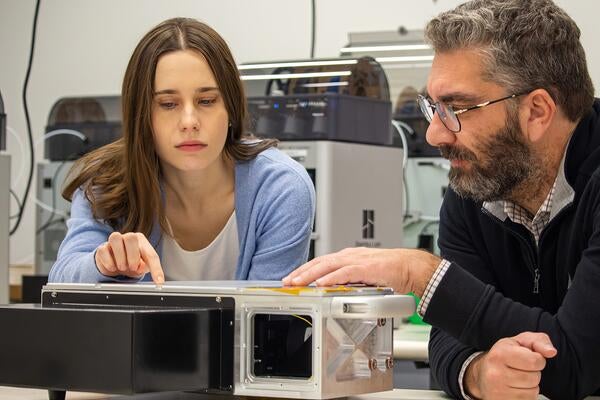
Planning for a more efficient future
Faculty of Mathematics faculty and staff reflect on the importance of mathematical optimization in addressing pressing challenges

Faculty of Mathematics faculty and staff reflect on the importance of mathematical optimization in addressing pressing challenges
By Melodie Roschman Faculty of MathematicsHow do skills developed in the math classroom translate to the workforce? How can we use resources most efficiently, whether fighting climate change or navigating economic challenges? What even is “mathematical optimization,” anyway?
The Faculty of Mathematics has developed a series of videos that attempts to answer these questions and more. The first in the series profiles the unique major of “Mathematical Optimization,” offered by the Department of Combinatorics and Optimization (C&O). The University of Waterloo is one of the only universities to offer this major, which combines foundational knowledge of combinatorics, linear optimization, decision theory and computer simulation with courses in economics, business and management science.
“Optimization specifically is about solving problems where you’re trying to optimize some outcome,” says David Jao, chair of C&O. “As you do this, you’ve always got real-world problems in mind: how do I optimize the outcome of this financial portfolio? How do I target my political advertising to get the most votes?”
The University of Waterloo is uniquely equipped to address these problems because it is home to the only dedicated Department of Combinatorics and Optimization in the world. “Your critical thinking builds so much in this degree,” says undergraduate Mathematical Optimization student Diana Constantinescu, “and that’s the biggest thing you need to succeed in the workplace.”
Watch the full video below to learn more about the Mathematical Optimization major at the University Waterloo.
This video is part of a new video series from the Faculty of Mathematics that aims to help prospective students and current non-Math-majors alike understand precisely what it is the university’s mathematicians do – and how these skills are essential in a rapidly changing job market.

A car’s exhaust pipe emits black carbon. This sooty form of pollution alters the “light environment” beneath the snow, affecting plant growth. (Kmatija/Getty Images)
Read more
Research into light and snow interactions provides new insights into how pollution can affect vegetation growth and impact ecosystems

Read more
Phantom Photonics’ quantum remote sensing technology offers precision for industries operating in extreme environments

Read more
How machine learning empowers collaboration between computer science, math and medical research
The University of Waterloo acknowledges that much of our work takes place on the traditional territory of the Neutral, Anishinaabeg, and Haudenosaunee peoples. Our main campus is situated on the Haldimand Tract, the land granted to the Six Nations that includes six miles on each side of the Grand River. Our active work toward reconciliation takes place across our campuses through research, learning, teaching, and community building, and is co-ordinated within the Office of Indigenous Relations.